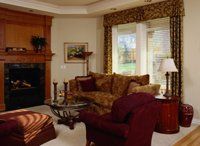Chimney Sweep History
Chimney Sweep History
In Victorian times, a tax was levied based on the number of chimneys a home had. To reduce the tax burden, chimneys started being built with more than one fireplace vented into the same chimney.
Also, small children were used to clean chimneys. Orphaned children as young as four were sold by orphanages to master sweeps to clean chimneys. The children were forced to climb up the chimney to clean the soot from the chimney walls with their hands and scrapers. It was normal for the children to become scared and reluctant to climb into the chimneys. It was common practice to light a small fire to force the child to the top. This is where the phrase "To light a fire under you" comes from.

There were no safety regulations to protect the children, and there are records of them suffocating from breathing dust, becoming trapped in narrow flues, or falling from the rotted stack to their deaths.
In the early part of the 18th century, various types of cleaning methods were invented, which are still in use today. These involved a system of canes and brushes, which could be pushed up into the chimney from below. With the onset of the industrial revolution and increased demand for coal production, the chimney sweep profession thrived in London. There were more than 1000 chimney sweeps. The continued use of coal as the main fuel for heating ensured that the trade flourished.
In the early 1960s, gas replaced coal as a fuel for heating. Many of the old, established chimney sweeps retired or gave up the business.
With the energy crisis of the 1970s, and a large increase in the cost of gas, people again turned to heating with wood, creating a new demand for chimney sweeps. "But rest assured, we do not use children to clean chimneys anymore."
Not all chimney sweep history is bad. It has always been considered good luck to have a chimney sweep in your home in many parts of the world. Chimney sweeps are invited to weddings to bring luck to the marriage. In China, chimney sweeps are associated with birth, as it is said the stork will not come to a dirty chimney. In Germany, to prevent fires, it is required by law to have your chimneys cleaned and inspected. The service is paid for by the state, so what better reason could there be for taking a day off work and having a few beers with the chimney sweep?
Ash Wipers Chimney Sweep Inc.
Incorporated Since 1993
Kirkwood: 314-965-6622
Ballwin: 636-386-3277
Our Service Areas:
Afton, Ballwin, Brentwood, Chesterfield, Clarkson Valley, Clayton, Concord Village, Crestwood, Creve Coeur, Fenton, Frontenac, Glendale, Grantwood Village, Grover, Huntleigh, Kirkwood, Ladue, Lemay, Manchester, Mehlville, Oakville, Rock Hill, Sappington, Shrewsbury, Sunset Hills, Town and Country, University City, Valley Park, Warson Woods, Webster Groves, Wildwood, Winchester, St. Louis
Chimney Sweep History
In Victorian times, a tax was levied based on the number of chimneys a home had. To reduce the tax burden, chimneys started being built with more than one fireplace vented into the same chimney.
Also, small children were used to clean chimneys. Orphaned children as young as four were sold by orphanages to master sweeps to clean chimneys. The children were forced to climb up the chimney to clean the soot from the chimney walls with their hands and scrapers. It was normal for the children to become scared and reluctant to climb into the chimneys. It was common practice to light a small fire to force the child to the top. This is where the phrase "To light a fire under you" comes from.

- There were no safety regulations to protect the children, and there are records of them suffocating from breathing dust, becoming trapped in narrow flues, or falling from the rotted stack to their deaths.
In the early part of the 18th century, various types of cleaning methods were invented, which are still in use today. These involved a system of canes and brushes, which could be pushed up into the chimney from below. With the onset of the industrial revolution and increased demand for coal production, the chimney sweep profession thrived in London. There were more than 1000 chimney sweeps. The continued use of coal as the main fuel for heating ensured that the trade flourished.
In the early 1960s, gas replaced coal as a fuel for heating. Many of the old, established chimney sweeps retired or gave up the business.
With the energy crisis of the 1970s, and a large increase in the cost of gas, people again turned to heating with wood, creating a new demand for chimney sweeps. "But rest assured, we do not use children to clean chimneys anymore."
Not all chimney sweep history is bad. It has always been considered good luck to have a chimney sweep in your home in many parts of the world. Chimney sweeps are invited to weddings to bring luck to the marriage. In China, chimney sweeps are associated with birth, as it is said the stork will not come to a dirty chimney. In Germany, to prevent fires, it is required by law to have your chimneys cleaned and inspected. The service is paid for by the state, so what better reason could there be for taking a day off work and having a few beers with the chimney sweep?
Ash Wipers Chimney Sweep Inc.
Incorporated Since 1993
Kirkwood: 314-965-6622
Ballwin: 636-386-3277
Our Service Areas:
Afton, Ballwin, Brentwood, Chesterfield, Clarkson Valley, Clayton, Concord Village, Crestwood, Creve Coeur, Fenton, Frontenac, Glendale, Grantwood Village, Grover, Huntleigh, Kirkwood, Ladue, Lemay, Manchester, Mehlville, Oakville, Rock Hill, Sappington, Shrewsbury, Sunset Hills, Town and Country, University City, Valley Park, Warson Woods, Webster Groves, Wildwood, Winchester, St. Louis
Chimney Sweep History
In Victorian times, a tax was levied based on the number of chimneys a home had. To reduce the tax burden, chimneys started being built with more than one fireplace vented into the same chimney.
Also, small children were used to clean chimneys. Orphaned children as young as four were sold by orphanages to master sweeps to clean chimneys. The children were forced to climb up the chimney to clean the soot from the chimney walls with their hands and scrapers. It was normal for the children to become scared and reluctant to climb into the chimneys. It was common practice to light a small fire to force the child to the top. This is where the phrase "To light a fire under you" comes from.

There were no safety regulations to protect the children, and there are records of them suffocating from breathing dust, becoming trapped in narrow flues, or falling from the rotted stack to their deaths.
In the early part of the 18th century, various types of cleaning methods were invented, which are still in use today. These involved a system of canes and brushes, which could be pushed up into the chimney from below. With the onset of the industrial revolution and increased demand for coal production, the chimney sweep profession thrived in London. There were more than 1000 chimney sweeps. The continued use of coal as the main fuel for heating ensured that the trade flourished.
In the early 1960s, gas replaced coal as a fuel for heating. Many of the old, established chimney sweeps retired or gave up the business.
With the energy crisis of the 1970s, and a large increase in the cost of gas, people again turned to heating with wood, creating a new demand for chimney sweeps. "But rest assured, we do not use children to clean chimneys anymore."
Not all chimney sweep history is bad. It has always been considered good luck to have a chimney sweep in your home in many parts of the world. Chimney sweeps are invited to weddings to bring luck to the marriage. In China, chimney sweeps are associated with birth, as it is said the stork will not come to a dirty chimney. In Germany, to prevent fires, it is required by law to have your chimneys cleaned and inspected. The service is paid for by the state, so what better reason could there be for taking a day off work and having a few beers with the chimney sweep?
Ash Wipers Chimney Sweep Inc.
Incorporated Since 1993
Kirkwood: 314-965-6622
Ballwin: 636-386-3277
Our Service Areas:
Afton, Ballwin, Brentwood, Chesterfield, Clarkson Valley, Clayton, Concord Village, Crestwood, Creve Coeur, Eureka, Fenton, Frontenac, Glendale, Grantwood Village, Grover, Huntleigh, Kirkwood, Ladue, Lemay, Manchester, Mehlville, Oakville, Rock Hill, Sappington, Shrewsbury, Sunset Hills, Town and Country, University City, Valley Park, Warson Woods, Webster Groves, Wildwood, Winchester, St. Louis
Content, including images, displayed on this website is protected by copyright laws. Downloading, republication, retransmission or reproduction of content on this website is strictly prohibited. Terms of Use
| Privacy Policy
Content, including images, displayed on this website is protected by copyright laws. Downloading, republication, retransmission or reproduction of content on this website is strictly prohibited. Terms of Use
| Privacy Policy

